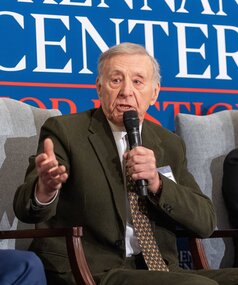
A Conversation with Former New York High Court Judge Albert Rosenblatt
Rosenblatt spoke about the importance of closing the access-to-justice gap and the friendships he developed with his fellow judges.
In February 2024, the Brennan Center for Justice, State Court Report, and the NYU Law Review hosted a symposium dedicated to state constitutional law. Several state supreme court justices who participated in the program sat down for brief interviews with State Court Report, which we are publishing as a series.
Albert Rosenblatt was confirmed to the New York Court of Appeals — New York’s highest court — in 1998 and served until 2006. He previously served as a state trial judge and as district attorney of New York’s Dutchess County. In his interview, Rosenblatt discussed the importance of closing the access-to-justice gap, the most memorable cases from his time on the high court, and the friendships he developed with his fellow judges.
The following interview has been edited for length and clarity. Additional excerpts from Rosenblatt’s interview will be featured in later pieces.

What did you enjoy about being a state court judge?
I was a trial judge for a time, but most of my years were spent on the New York Court of Appeals. I was very lucky to have great colleagues. I admire them all and have great affection for them all, and I enjoyed interacting with them. The interactions I had with my colleagues on the court for the many years of my tenure on the bench were a special privilege.
Personal friendships emerged. We just talked about everything. We had a custom that when we all went to dinner, we did not talk law. That was the deal. We could talk about anything but the law and the cases before us. So that generated friendship and collegiality, which was really cool.
What is something that people might not know about your state constitution?
Most people don’t know it even exists. When people say, “my constitutional rights,” they aren’t usually referring to the state constitution. They are referring to the federal Constitution. They don’t realize that the state constitution can offer those same rights and even expanded rights or freedom from restrictions. New Yorkers have expanded constitutional rights during encounters with police, as one example. And the right to counsel is particularly important in state constitutional law, and more robust than under the federal Constitution. And, of course, due process under the state constitution is stronger. Those stand out.
What were some of the opinions you participated in that are most memorable to you?
We tackled the homicide hierarchy in New York in the early 2000s, over a period of three or four years. We had a variety of cases that required us to determine what qualifies as “depraved indifference murder” and to differentiate it from other categories of homicide. There was an odd statute that basically equated depraved indifference murder with intentional murder. Prosecutors were charging depraved indifference murder alongside intentional murder, as a fallback, and lots of juries were convicting people of that charge even though the evidence did not support it. It created a whole lot of legal conflict over the meaning of depraved indifference murder.
In my view, and ultimately in the view of some of my colleagues, the crime of depraved indifference murder is reserved only for only the most egregious behavior short of involving the intent to kill. It’s an indifference to killing someone. It’s like somebody saying, “I’m going to take the key from the zookeeper when he’s not looking and I’m going to open up the lion’s cage and then we’ll see what happens.” And then disaster happens and death ensues. Is that intentional murder? No, but it is depraved and it shows indifference to human life. That crime should be reserved for behavior analogous to that, a very small category of cases. It was legally fascinating, and high-pressure.
What are some challenges facing state courts?
Access to justice is one of the primary issues. The politics of access to justice. Is the public willing and able to provide access to justice and access to the courts as much as they want to provide, for example, access to medical care? How costly would that be? I don’t know the finances of it, but I would be interested to learn how access to justice is managed in countries that do prioritize it.
There’s inequality in the justice system because people with means can game the system, whereas people without means are sometimes unable to even gain access, let alone game it. We need less gaming and more access.
Do you think there is a lawyer shortage in this country?
I grew up hearing that there are too many lawyers, but you don’t hear that anymore. Maybe it’s because we now appreciate that there are so many people who need a lawyer and don’t have one. While that suggests there should be more lawyers, remember that more lawyers doesn’t necessarily mean that more people have access to the lawyers. There has to be a bridge connecting lawyers to the people who need them. Again, what stands out in my mind that that access could be improved and should be improved.
Erin Geiger Smith is a writer and editor at the Brennan Center for Justice.
Suggested Citation: Erin Geiger Smith, A Conversation with Former New York High Court Judge Albert Rosenblatt, Sᴛᴀᴛᴇ Cᴏᴜʀᴛ Rᴇᴘᴏʀᴛ (May 15, 2024), https://statecourtreport.org/our-work/analysis-opinion/conversation-former-new-york-high-court-judge-albert-rosenblatt.



Related Commentary
State Law Gives Litigators Extra Tools to Counter Originalism
Unique features of state courts allow lawyers to go beyond arguments available in federal courts.
The Diversity of Rights in State Constitutions
Transcript of panel from Symposium: The Power of State Constitutional Rights
A Conversation with Chief Judge Jeffrey S Sutton Court of Appeals for the Sixth Circuit
Transcript of panel from Symposium: The Power of State Constitutional Rights
Welcome
Transcript of panel from Symposium: The Power of State Constitutional Rights